|
|
|
Sort Order |
|
|
|
Items / Page
|
|
|
|
|
|
|
| Srl | Item |
| 1 |
ID:
115400
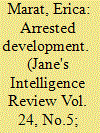

|
|
|
| 2 |
ID:
172542
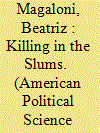

|
|
|
|
|
| Summary/Abstract |
State interventions against organized criminal groups (OCGs) sometimes work to improve security, but often exacerbate violence. To understand why, this article offers a theory about criminal governance in five types of criminal regimes—Insurgent, Bandit, Symbiotic, Predatory, and Split. These differ according to whether criminal groups confront or collude with state actors, abuse or cooperate with the community, and hold a monopoly or contest territory with rival OCGs. Police interventions in these criminal regimes pose different challenges and are associated with markedly different local security outcomes. We provide evidence of this theory by using a multimethod research design combining quasi-experimental statistical analyses, automated text analysis, extensive qualitative research, and a large-N survey in the context of Rio de Janeiro’s “Pacifying Police Units” (UPPs), which sought to reclaim control of the favelas from criminal organizations.
|
|
|
|
|
|
|
|
|
|
|
|
|
|
|
|
| 3 |
ID:
153224
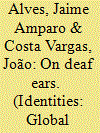

|
|
|
|
|
| Summary/Abstract |
In this essay, we explore the racialised dimensions of policing practices in Brazil. To do so, we look not at the police, their administrative organisation, and practices, but rather we examine the modes of sociality reflected in and produced by police violence. Drawing from a statistics-based analysis of the social and political outcomes produced by the state in its preparation of mega-sports events – evictions, incarceration, and police violence, for example – we identify a nexus between, on the one hand, racialised violence against black bodies and, on the other hand, white loyalty to the state, despite, or precisely because of, a specific type of violence perpetrated by the state on white bodies. Our primary contention is that we cannot understand white victimisation by the police – and the outrage it produces – without taking into consideration two foundational, dialectical aspects of the regime of rights: complicity and disavowal. White vulnerability to this specific form of state violence – a form of violence that is contingent and produces collective horror – reflects not only the disavowal of black suffering, but also the strengthening of the white public sphere.
|
|
|
|
|
|
|
|
|
|
|
|
|
|
|
|
| 4 |
ID:
171353


|
|
|
|
|
| Summary/Abstract |
The convergence of sports and celebrity can have a powerful influence on everyday politics, especially for groups underrepresented in mainstream American society. This article examines the relationship between race, celebrity, and social movements, specifically Colin Kaepernick’s protest of police violence and whether his activism mobilizes black Americans to political action. Using the 2017 Black Voter Project (BVP) Pilot Study, we explore African American political engagement in the 2016 election, a time devoid of President Obama as a mobilizing figure. We find African Americans who strongly approve of Kaepernick’s protest engage in politics at elevated rates, even after accounting for alternative explanations. Moreover, approval for Kaepernick also moderates other forces rooted in group identity, such as identification with the Black Lives Matter movement. In the end, Kaepernick and the protest movement he leads offers a powerful mobilizing force for African Americans.
|
|
|
|
|
|
|
|
|
|
|
|
|
|
|
|
| 5 |
ID:
163153
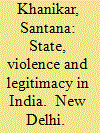

|
|
|
|
|
| Publication |
New Delhi, Oxford University Press, 2018.
|
| Description |
xiv, 269p.; map, figureshbk
|
| Standard Number |
9780199485550
|
|
|
|
|
|
|
|
|
|
|
|
Copies: C:1/I:0,R:0,Q:0
Circulation
| Accession# | Call# | Current Location | Status | Policy | Location |
| 059581 | 353.46095456/KHA 059581 | Main | On Shelf | General | |
|
|
|
|
| 6 |
ID:
184702
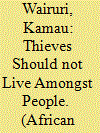

|
|
|
|
|
| Summary/Abstract |
This paper examines how communities at the urban margins, who are under-protected by the state police, understand police reforms through an examination of the unusual case of street protests in support of a police officer who had killed two young men in Githurai in Nairobi. I explore how the under-protection of communities at the urban margins by the police leads to a reliance on various forms of vigilantism to generate security and justice outcomes. Noting the limitations of community vigilantism, I explore how these communities come to rely on police vigilantism, a form of vigilantism that has received limited attention in African studies. Based on insights generated from data collected in Githurai in March and April 2015, I argue that residents of Githurai protested against the arrest of a local police vigilante, whom they had come to rely on for security, because they considered his deployment of violence against suspected criminals to be justified and also feared that his arrest would expose them to further insecurity. I conclude that police reform efforts should pay attention to the innovations that communities have developed at the grassroots to generate security and justice outcome in absence of reliable protection by the state police.
|
|
|
|
|
|
|
|
|
|
|
|
|
|
|
|
|
|
|
|
|